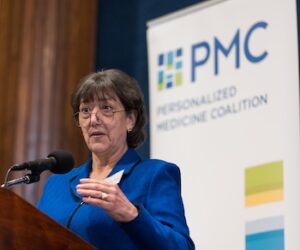
On May 23, during the Personalized Medicine Coalition’s 16th Annual State of Personalized Medicine Luncheon at the National Press Club in Washington, DC, the Coalition’s keynote speaker, U.S. National Institutes of Health (NIH) Director Dr. Monica Bertagnolli, outlined her vision for the future of biomedical research and personalized medicine.
Dr. Bertagnolli’s remarks, which you can listen to using the audio recording provided here, remind us that NIH, which is the largest public funder of biomedical research in the world, remains committed to driving scientific progress in personalized medicine.
Her speech considered the tremendous potential of personalized medicine to improve health care for patients with cancers, rare diseases, and chronic and infectious diseases, among other conditions.
She emphasized the significance of molecular tests that can provide insights on the genetic underpinnings of many cancers and point some patients toward one of the hundreds of safe and effective molecularly informed treatment options that have come to the market since 2003.
She said genetic testing had revealed that 90 percent of the patients participating in NIH’s All of Us Research Program have genetic mutations that could influence the safety and effectiveness of certain drugs. This, she said, underlines the potential of pharmacogenetic testing to improve health care for large numbers of patients.
She discussed how information from wearable monitors and other remote data collection technologies could provide new insights on which prevention and treatment strategies work best for which patients.
And she considered the importance of environmental and social factors that put some patients at greater risk for disease than others.
Dr. Bertagnolli’s remarks underline that the latest developments in science and medicine increasingly point to a future in which health care is predictive, preventive, and personalized.